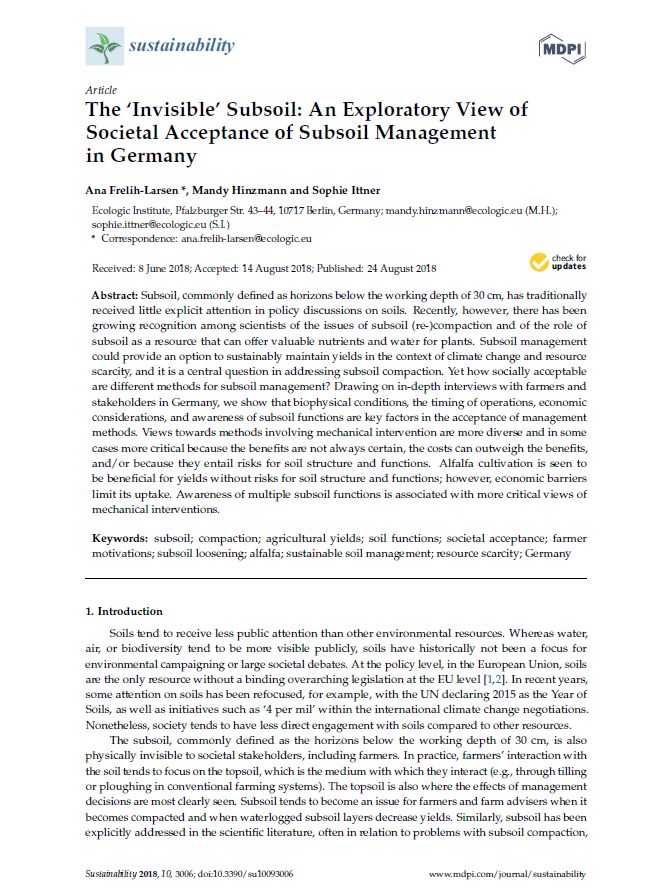Fertile soils are an indispensable resource for agriculture and the Bioeconomy as a whole. Subsoils contain a major part of the nutrients essential for plants, a resource potential that has thus far not yet been fully understood nor used. In order to harness this untapped potential, the Soil³ project examines the subsoil processes and application of alternative subsoil management measures. The Ecologic Institute will conduct research on the costs, benefits and social acceptance of these measures.
Objectives and starting point of Soil³
The project Soil³ – Sustainable Subsoil Management – aims to improve the overall nutrient and water use efficiency of plants through subsoil management in order to secure or increase crop yields. The term ‘subsoil’ refers to the soil beneath the tilled or formerly tilled soil in arable farming systems (approximately 30 cm below surface). Immense water, carbon, and nutrient reservoirs can be found in the subsoil.
Soil³ is based on the assumption that nutrient and water uptake from the subsoil can be increased when there are attractive options for the plants to invest into subsoil roots. Such options can involve low physical resistance for the root channels, hotspots of higher microbially facilitated nutrient supply in the subsoil, as well as subsoil water available to plants under conditions of seasonal drought stress in the surface soil. Management measures investigated by the Soil³ project include subsoil loosening (e.g. by means of a special milling cutter) and the injection of organic matter (e.g. compost, straw, green waste or wood shavings).
Soil³ is part of the BonaRes funding programme of the German Federal Ministry of Education and Research (BMBF) under the umbrella of the National Research Strategy BioEconomy 2030. The Bioeconomy concept aims to deliver the transformation to a sustainable, bio-based economic system, with renewable biological resources forming the basis for product manufacturing and the provision of services. Fertile soils are a key element in securing the production of biomass, which can be used as food, building material or energy source. Subsoil management measures can contribute to securing the soils’ yield potential and increasing their productivity in the long-term.
Research focus of the Ecologic Institute
Within the Soil³ project, the Ecologic Institute leads the work package "Socio-economic Implications of Subsoil Management". This work package examines the financial, economic and societal effects of alternative options of subsoil management for different regions and under different policy scenarios. The analysis is composed of three elements:
- By means of a cost-effectiveness analysis, the costs and effects of different management options at farm level are determined.
- In parallel, an extended cost-benefit analysis is carried out, taking into account the external costs and benefits of relevant measures, including the effects on ecosystem services provided by multifunctional agriculture.
- Finally, a social acceptance analysis based on innovative, participative methods is carried out to derive insights on the socio-economic barriers and opportunities to the implementation of selected subsoil management measures.
Applying a stakeholder-driven approach, the following research questions are examined: Which factors determine the acceptance and uptake of subsoil management measures by farmers? How are the financial and economic impacts of applied subsoil management measures distributed across scales and actors? Which regulatory, economic and voluntary policy instruments – and their mix – would maximise farmers’ adoption of subsoil management measures? Based on the findings, targeted policy recommendation for an effective and efficient management of subsoil in Germany will be developed.
Soil3 is being coordinated by the Institute of Crop Science and Resource Conservation (INRES), Division Soil Sciences, at the University of Bonn. The project has been designed for a total duration of nine years (2015-2024).





